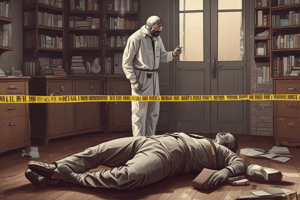Podcast
Questions and Answers
What does the term 'forensic' mean in Latin?
What does the term 'forensic' mean in Latin?
- Before the public forum (correct)
- Evidence of a crime
- Related to crime
- Science of investigation
What is the definition of forensic science?
What is the definition of forensic science?
- The science concerned with the prevention of crimes
- Any science used to prove whether things did or didn’t happen in a crime (correct)
- A branch of science focused solely on criminal psychology
- The study of natural sciences applied to legal matters
Which role is primarily responsible for collecting evidence at the crime scene?
Which role is primarily responsible for collecting evidence at the crime scene?
- Scene of crime officer (correct)
- Police officer
- Forensic scientist
- Court clerk
Which organization ensures quality assurance in forensic processes in the UK?
Which organization ensures quality assurance in forensic processes in the UK?
What must be established for a court case to proceed?
What must be established for a court case to proceed?
What is the primary implication of Edmund Locard's exchange principle?
What is the primary implication of Edmund Locard's exchange principle?
Why is context important when analyzing evidence at a crime scene?
Why is context important when analyzing evidence at a crime scene?
Which of the following is NOT considered a serious crime?
Which of the following is NOT considered a serious crime?
What is the role of the Senior Investigating Officer (SIO) in a major crime investigation?
What is the role of the Senior Investigating Officer (SIO) in a major crime investigation?
What does the term 'cross contamination' refer to in crime scene investigations?
What does the term 'cross contamination' refer to in crime scene investigations?
Which statement about evidence collection is accurate?
Which statement about evidence collection is accurate?
What is a primary function of crime scene investigation teams?
What is a primary function of crime scene investigation teams?
How does forensic science support police intelligence?
How does forensic science support police intelligence?
Which of the following roles is primarily responsible for managing crime scene teams and ensuring safety?
Which of the following roles is primarily responsible for managing crime scene teams and ensuring safety?
Which of the following is considered a characteristic of volume crime scenes?
Which of the following is considered a characteristic of volume crime scenes?
Flashcards are hidden until you start studying
Study Notes
Crime Scene and Investigation Overview
- Crime scenes are defined as any location where a crime has occurred, potentially including buildings, vehicles, or outdoor spaces.
- A secondary crime scene can refer to evidence or a victim moved from the original location.
- Forensic science, meaning "before the forum" in Latin, is crucial for validating crime-related events through scientific examination.
Historical Context
- The first documented use of forensic science was in 44 BC when Julius Caesar was assassinated; physician Antistius performed an autopsy.
- The concept of forensic examination emphasizes the importance of physical evidence in legal proceedings.
Roles and Processes in Investigation
- Various roles are involved in a crime scene investigation, including Scenes of Crime Officers, SIOs, crime scene coordinators, and forensic lab personnel.
- Investigations follow a structured flow: crime scene to officers, forensic support unit, laboratory, and court presentation.
Forensic Science and Evidence Management
- Evidence must be carefully collected and preserved; continuity tracking is essential to show evidence integrity.
- Quality assurance in forensic processes ensures compliance with established codes of practice.
- The UKAS (United Kingdom Accreditation Services) provides accreditation, but not all organizations are accredited.
Types of Crimes
- Volume crimes (e.g., street robberies, burglaries) occur frequently and significantly impact communities.
- Serious crimes involve violence or financial gain, including arson, robbery, and sexual assault.
Major Crimes and Investigation Protocol
- Major crimes include murder, attempted murder, and terrorism, usually requiring more resources and coordination among various investigative teams.
- The senior investigating officer (SIO) is responsible for managing inquiries and coordinating efforts within the investigation team.
Crime Scene Management
- Crime scene managers supervise investigation teams, delegate tasks, and ensure compliance with health and safety protocols.
- Each officer at the scene must avoid cross-contamination and adhere to ethical and legal standards throughout the investigation.
Key Investigation Questions
- Investigators must consider the following critical questions:
- What are the aims of the investigation?
- Who is the victim?
- When and where did the crime occur?
- What sequence of events transpired?
- What was the criminal's modus operandi?
Importance of Context and Trace Evidence
- Contextual information regarding where evidence is found is vital since some evidence cannot be accurately timestamped.
- Edmund Locard's exchange principle asserts that every contact leaves a trace, facilitating connections to crime scenes.
Best Practices for CSIs
- Crime Scene Investigators (CSIs) must work methodically, ethically, and communicate effectively while remaining impartial.
- A thorough examination and record-keeping during evidence collection are essential for maintaining the integrity of the investigation.
Studying That Suits You
Use AI to generate personalized quizzes and flashcards to suit your learning preferences.




